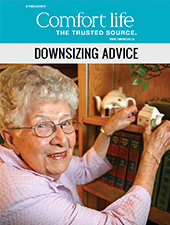Finding the best Alzheimer's home: Nine tips
Story of the month: “Finding the best Alzheimer's home: Nine tips.”Today is "Story of the month" day on the blog! This is when we look at the post that garnered the greatest response from you, our readers. It’s a post that was so popular and useful, that it is worth checking out again. This month, that post is this one:
Choosing the right Alzheimer's home for your loved one can be a frightening experience but sound information makes it easier. When choosing the right home, the philosophy and appropriate level of care, preferred location and budget all need to be considered.

When staying at home is no longer an option, assisted living facilities are a good choice for early to middle signs of Alzheimer’s. If they have trained staff with a specialized wing and dementia programs you can move this housing option to the top of your list. Specialized dementia care residences for advanced Alzheimer's care are excellent when more supervision and care are needed than what is offered at an assisted living complex. Look for trained staff, appropriate activities, secure exits and enhanced visual cues, such as large signs and pictures. This will help your loved one feel more oriented in unfamiliar surroundings.
Another option is a nursing home, also known as a long-term care home. This type of home offers medical care, 24-hour nursing and special units for Alzheimer's care. Activities evolve around the resident's particular needs.
Nine tips for finding the best Alzheimer's home:
1. Does the residence offer various wings and differing levels of specialized care?
This allows individuals to retain their independence for as long as possible. As their condition progresses your loved one is able to remain in the same complex and will not be traumatized by moving to a different residence in a different location.
2. Is the home ready for the onset and advancement of specific conditions, such as Alzheimer's?
It is important to ask about the residence’s safety and security measures. Consider asking if your loved one will be living in an area that is secure 24 hours a day and if Alzheimer's care residents have access to outdoor areas such as courtyards. Ask how that area is secured. Ask what kind of activities are offered throughout the day and evening. Ask if they provide memory and brain stimulation exercise classes. Be sure to look for large picture signs to help loved ones find their way around the building. Plenty of toilets throughout the complex are a blessing to help with incontinence problems. Is the home wheelchair accessible?
3. Is the staff trained to care for those with dementia and/or provide appropriate activities?
Ask the program director if the staff has had special training to understand the effects of Alzheimer's disease and if they promote ongoing education. Ask the staff questions about the program. Ask Alzheimer's care residents and visitors how they feel about the program and its staff. Consider spending time in the Alzheimer's care unit so you can see firsthand the interaction between the residents and staff. Inquire if the staff has participated in any training programs offered by the Ministry or the Alzheimer's Society. Do they have patience with the demands of the patient’s physical needs and do they help maximize their independence.
4. Are visitors welcomed at any time?
Make sure that there is good communication between you and the home and that phone calls and visits are encouraged. If not, think twice about this particular facility. Interaction with visitors, other residents and the community should be encouraged but each home is permitted to determine their own visiting hours.
5. Are restraining devices used?
Dementia will cause changes in the way people react and respond to situations. These reactions may be the only way the person can communicate and they may be unruly and angry.
Discuss the three types of restraints: Physical restraints restrict or control movement or behaviour. They may be attached to a person's body or they may be used to create physical barriers. Chemical restraints are medications used to modify or restrict behaviour such as tranquilizers and sedatives. Environmental restraints change or modify a person's surroundings to restrict or control movement, for example, a locked door.
If restraints are used the family must be informed. The home will document the use of any restraints and there will also be documentation every time a restraint is assessed.
6. Is this home an accredited health care facility? Long-term care homes are licensed or approved by the Ministry of Health and Long-Term Care. The Ministry of Health and Long-Term Care is accountable for regulating, inspecting, and setting the fees for nursing home care.
Various residences promote their membership in The Ontario Retirement Community Association (ORCA) which is a representative of the seniors retirement residence sector. ORCA ensures that the home meets upcoming legislated requirements.
7. What medical professionals are available and how often?
Inquire if the home has access to certified psychiatric mental health nurses or possibly an audiologist to assist with hearing impairment and communication breakdown which can be prevalent in dementia. Is a doctor available on site or on-call 24/7? Does a doctor make regular visits? Ask if there is a main or head nurse who will be in charge of your loved one's care.
8. How are prescriptions, tranquilizers and sedatives handled?
When patients, caregivers, family members, doctors and pharmacists function as a team, medication-related problems can be avoided. Do your part by knowing what medication your loved one is on and when it needs to be taken. Make sure you clarify this to all involved at the care home. If you are concerned about the home giving sedatives or tranquilizers make sure they notify you. You need to have done your homework in order to make a good and quick decision if this medication should be administered. This homework includes asking the doctor or head nurse ahead of time to find out what medication they have on hand. Discuss your loved one's personal health records to know which type of medication may be best based on their present medications and health condition.
9. What is the staff to resident ratio? Typically if you have one staff member per every six residents, conscientious and quality care should result. Talk to the other residents and their families about their experiences with the care that is provided.
by Julie Wilson, author of "Beyond the Sold Sign: A Canadian real estate planning guide for Seniors". www.beyondthesoldsign.ca
****
Related articles:
Alzheimer's and Dementia: What is the difference?
Alzheimer's care homes in Canada
Lifetimes: The Game of Reminiscence
Drink coffee and avoid Alzheimer's
Reduce Alzheimer's risk with tea and vitamin D
Dementia care: finding the right care for other forms of dementia


